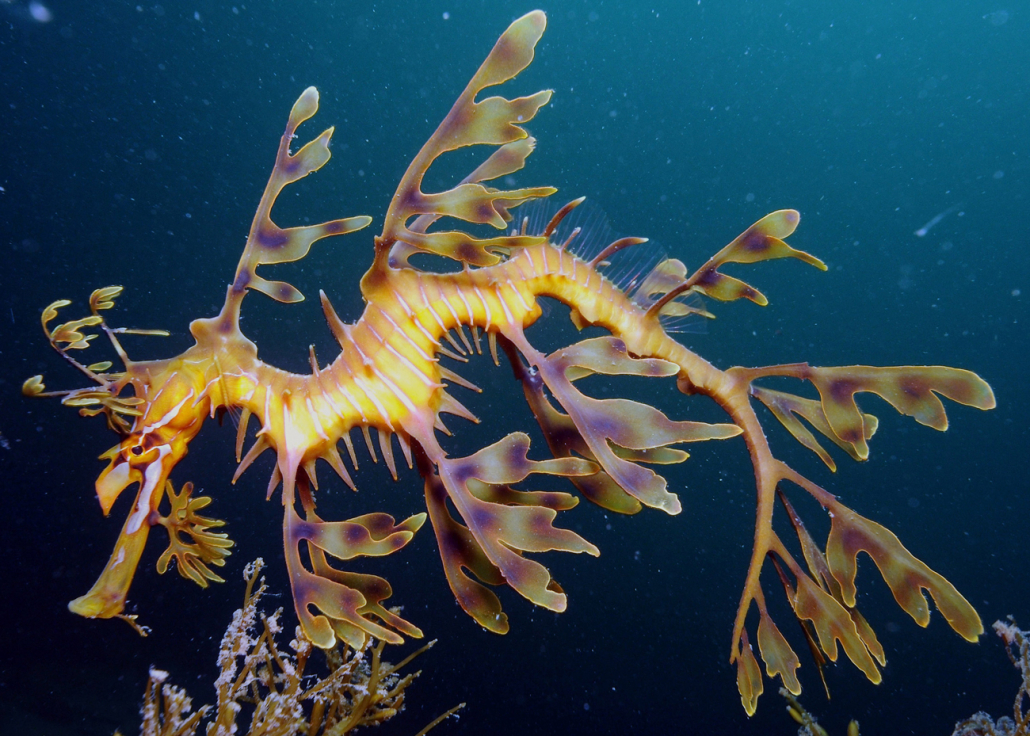Image: Leafy sea-dragon (photo by James Rosindell/Wikimedia Commons).
‘All things remembered in Christ’
Andrew Collis
Ocean Sunday, Season of Creation
Job 38:1-18; Ephesians 1:3-10; Luke 5:1-10
I remember, as a boy, how much I loved the beach. In my memories, my father plays a prominent part. Teaching me to swim – I remember being carried along, my hands on his shoulders. Teaching me how to fish – from the rocks, from the shore. Riding my surf-ski – he was always impressed by my sense of balance. I remember going sailing with my dad – the water was wild and I remember being very cold. I wasn’t as tough as him. I lacked his wisdom, too … his respect for the sea and for what happens in and on the water …
I used to fill steel cans with sand and throw them up into the air, make them spin and spill sand in swirling patterns like fireworks. Once, I lost sight of the spinning can and it came down and struck me on the head. My dad took me to the hospital …
I remember a birthday party one year. I was about 12. All I wanted was a birthday at the beach with my friends. I remember spending hours in the surf and the sun – and then the headache and nausea of sunstroke. Years later, I’d reflect on this experience in terms of awareness of colonial identity – I was a pale pink European on the “wrong” side of the world. There was work to do – Wisdom to pursue – if I were ever to feel at home in this country …
As a teenager I used to hang out at the beach … on Saturday mornings. My mate Richard had a khaki green Kombi and my mate Dave was always keen for a body surf …
I remember being caught in a rip. I was swimming alone at North Cronulla, beyond the patrols. One of those terrifying experiences I don’t think about much. I remember feeling sure that I would drown, I was so far out … A surfer came to my rescue – I don’t know where she came from.
I remember my 21st – an all-night “clam-bake” at Jibbon Beach – guitars, fires, eskies, friends in Hawaiian shirts.
I remember my first experience of snorkeling – at Jervis Bay – and the miracle of improved vision underwater. An exhilarating sense of connection with the world beneath the waves – with the fish, with the weeds, with a Grey Nurse shark in the sand, and with my human companions.
During my first placement I lived in a unit on Marine Parade at Maroubra. I remember the sound of the waves crashing – a pleasant sound to hear at night. I remember the salt on the window frames and sills. I remember the smell of the salt air. I remember the healing quality of the water – the rejuvenation of surf, salt and sun.
It still offers a helpful interpretation of the Book of Job.
The God who appears to Job in the whirlwind, in flashing images of power and beauty, evokes the sea – tumbling, shifting the shoreline, smoothing the rocks. I think of the ocean’s paradoxical power to make calm. The ocean as venue par excellence of divine freedom – creativity beyond the certainties of reason and morality.
I can (almost) understand Job’s response to God: “Formerly I knew you only by word of mouth, but now I see you with my own eyes” (38:5). Everything looks different after an encounter with the ocean.
A keen surfer, Adrian co-wrote our intercessory prayer for today: “Hold us up, O God/ keep us alert./ Alive!/ Expand our thinking,/ our sense of belonging –/ giving and taking …”
“Now I see you with my own eyes” … “Now I see you with new/ocean/divine eyes” … There’s something mystical here – a Word other than “word of mouth” (mere human talk, opinion, reverie).
The sea is other …
It’s only because Simon Peter trusts Jesus that he takes the risk and casts into “the deep”, the realm of the unknown.
Luke’s text contains a little Greek word for “life” – zoe – that connotes “catching fish alive” as in some kind of sanctuary … The text, like a net, holds together these two ideas: catching fish alive and catching human beings alive.
According to Ephesians, Jesus the Word is a kind of text or net. God takes pleasure in revealing a plan that sees all things inscribed/gathered/remembered in Christ – in the Spirit/Wisdom of his life, death and resurrection.
The incarnation, says theologian Karl Rahner, involves a hypostatic union of the Word with not just the isolated humanity of Jesus, but with the matter of the universe itself, and with all its potentiality.
Rahner goes on to speak of the cross – now I see a net comprised of cross patterns – expressing God’s will to bring all into the divine life. God enters freely and lovingly into the pain and drama of existence.
In the Word made flesh, God embraces the whole of life on Earth, with all its evolutionary processes, in an event that is both a radical identification in love and an unbreakable promise – an unbreakable net.
Jesus calls Peter to cast a net into deep water … and to become a new kind of fisher. Amen.




